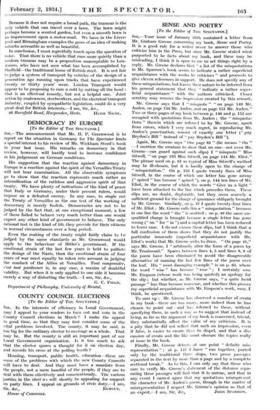SENSE AND POETRY [To the Editor of Tux SrEcrieroa.] SIR, —Your
issue of January 26th contained a letter from Mr. Graham Greene concerning my book, Sense and Poetry. It is a good rule for a writer never to answer those who criticize him in the Press, but since Mr. Greene stated what purported to be facts about my book, and these may be misleading, I think it is open to Inc to set things right by a reply. Mr. Greene declares that "a list of the misquotations in Mr. Sparrow's book seems to indicate a rather superficial acquaintance with the works he criticizes" and proceeds to give eleven references in support. He does not specify any of these misquotations, but leaves their nature to be inferred from his general statement that they " indicate a rather super- ficial acquaintance" with the authors criticized. Closer scrutiny may remove the impression created by this remark.
Mr. Greene says that I " misquote " "on page 149 Mr. Auden, on page 150 Mr. Auden, and on page 151 Mr. Auden." Two or three pages of my book between p. 146 and p. 152 are occupied with quotations from Mr. Auden ; the " misquota;. thins " therein which are referrei to by Mr: Greene, apart from errors, which I very much regret, in reproducing Mr. Auden's punctuation, consist of exactly one letter (" pay Brydon's Bill" instead of "pay Bryden's Bill ").
Again, Mr. Greene says "One page 81" (he means " On " —I mention the erratum to show that no one—not even Mr. Greene--can guard against such slips) I " misquote " Miss Sitwell, "on page 133 Miss Sitwell, on page 144 Mr. Eliot." The phrase used on p. 81 as typical of Miss Sitwell's method may be ill-chosen, but it is hardly open_ to the charge of "misquotation." On p. 133 I quote twenty lines of Miss Sitwell, in the course of which one letter has gone astray (" spired " has become " spined "), on p. 144 ten lines of Mr. Eliot, in the course of which the words "Give us a light" have been attached to the line which precedes them. These slips are, no doubt, deplorable, but they seem scarcely a sufficient ground for the charge of ignorance obliquely brought by Mr. Greene. Similarly, on p. 47 I quote twenty-four lines of Mr. Eliot : Mr. Greene calls this a" misquotation " because in one line the word " the" is omitted ; on p. 48 the same un- qualified charge is brought because a single letter has gone wrong (" on" for" in ") and a capital letter has been reduced to lower case. I do not excuse these slips, but I think that a full confession of them shows that they do not justify the particular innuendo (superficial acquaintance with Mr. Eliot's work) that Mr: Greene seeks to draw. "On page 41," says Mr. Greene, I "arbitrarily alter the form of a poem by Mr. Tesshnond." Spaces between lines 4, 5 and lines 8, 9 of the poem have been eliminated to avoid the disagreeable alternative of running the last few lines of the poem over the leaf. His "most damaging example" is on p. 65. where the word " wise " has become " rose " ; I certainly owe Mr. Etnpson (whose work was being quoted) an apology for the slip ; but whether, as Mr. Greene says, "a quite lucid passage" has thus become nonsense, and whether this proves my superficial acquaintance with Mr. Empson's work, may, I think, be questioned.
To sum up : Mr. Greene has observed a number of errata in my book—there are too many, more indeed than he has chosen to point out--and has referred to these, without specifying them, in such a way as to suggest that instead of being, as far as the argument of my book is concerned, trivial, they substantially affect the value of my criticism. It. is a pity that he did not reflect that such an impression, even if false, is easier to create th:tit to dispel, and that a dis- cussion of errata and the like must obscure the topics really at issue in the book. Finally, Mr. Greene detects at one point "definite mis- representation " ; at p. 147 I have "run together, parted' only by. the traditional three stops, two prose passages separated in the text by more than a page and by a complete sectional break." As to this, I can only say that those who care to verify Mr. Greene's statement of the distance sepa- rating these passages will find that it is untrue, and that in any event I cannOt agree that my quotations misrepresent the 'character of Mr. Auden's poem, though in the matter of misrepresentation I respect Mr. Greene's opinion as that of








































 Previous page
Previous page